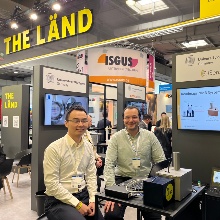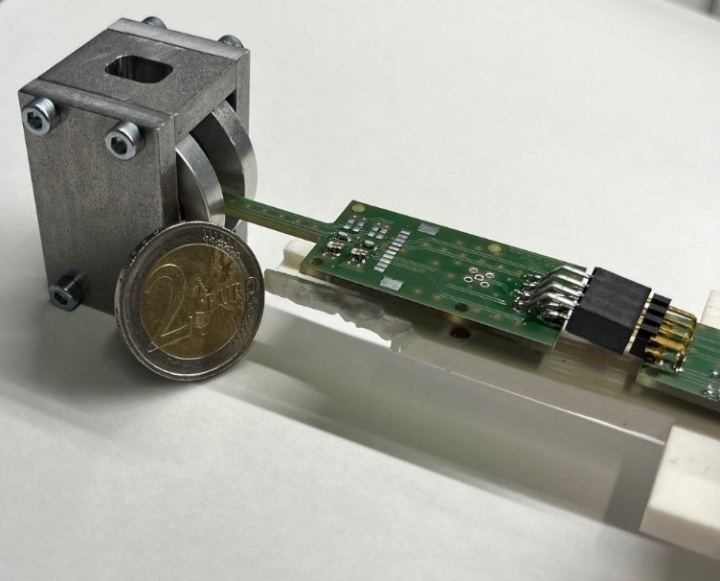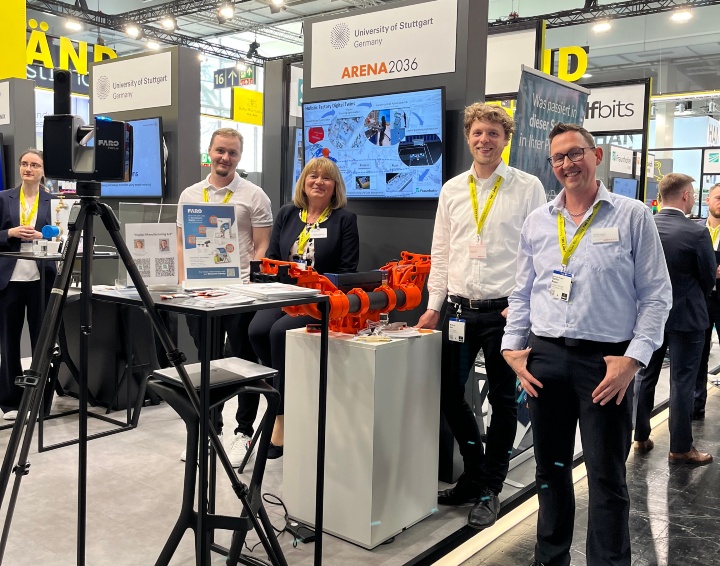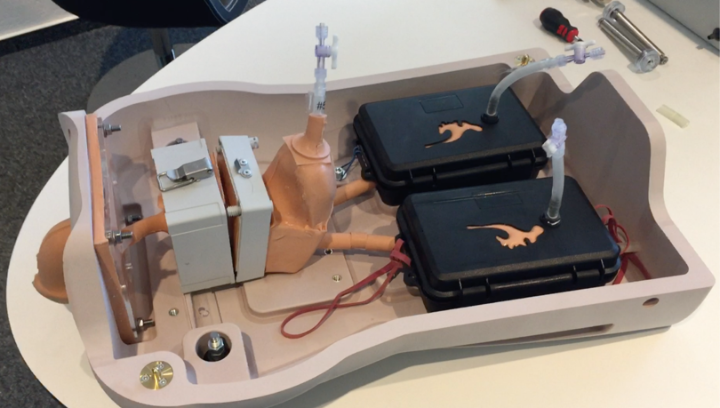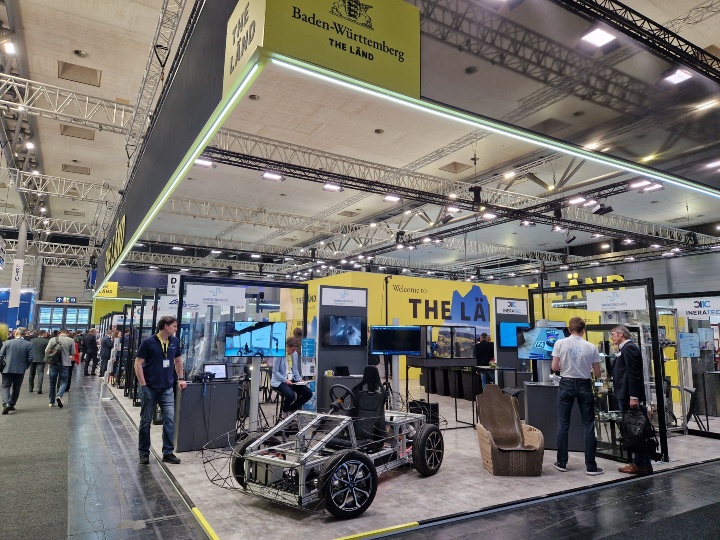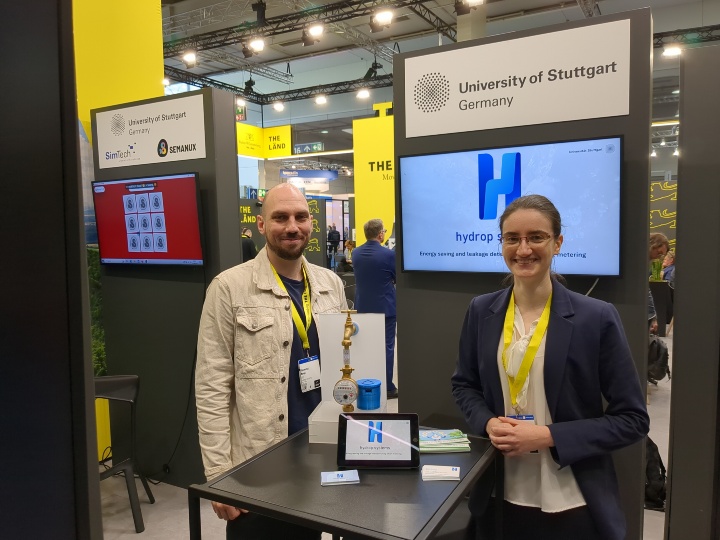The University of Stuttgart will be presenting its cutting-edge research results at Hannover Messe 2023, a global trade fair event that showcases research results and products from across the entire industrial value chain. The exhibition at the world's largest industrial trade fair will be on show from April 17 to 21. The University will once again be showcasing exhibits based on its cutting-edge research to trade fair visitors from around the world as a co-exhibitor at the "Baden-Württemberg Communal Stand," which is organized by Baden-Württemberg International (bw-i), the state's center of excellence for the internationalization of business, science and research, as well as the State of Baden-Württemberg Pavilion.
Commenting on the University's participation in the Hannover Messe, Prof. Wolfram Ressel, Rector of the University of Stuttgart, emphasized the importance for society of translating research findings into industrial innovations in a timely manner: "The University of Stuttgart," he said, "is an innovative, reliable, and respected partner for the transfer of knowledge and technology in business, science, and society. Providing our industrial partners with access to our research achievements as efficiently as possible is one of our strategic goals."
The following University of Stuttgart exhibits will be on display at the Hannover Messe:
QSens: tangible quantum sensors Hall 15/Booth A06
Hall 15/Booth A06
Quantum technology is a new field of research, which combines the physical foundations of quantum mechanics with the practical aspects of engineering. The potential of quantum sensor technology in particular to produce the first industrially relevant applications in the next few years is extremely high. As a rule, quantum sensors exhibit excellent inherent specificity as well as enabling detection thresholds close to the limits of what is theoretically possible. As such, quantum sensors are ideal candidates to meet the steadily increasing demand for ultra-precise sensor technology both in the industrial and consumer sectors.
Together with three non-university research institutions and 18 industrial partners, the Universities of Stuttgart and Ulm are conducting research into the industrial use of quantum sensor technology as part of the BMBF-funded "QSens – Quantum Sensors of the Future" cluster. This research activity has resulted in the first portable quantum sensors, which work by measuring nuclear and electron spins. These will be on display at the University of Stuttgart's booth at the Hannover Messe where visitors will have the chance to try them out. One initial potential target application would involve the high-precision quality control of manufacturing processes in the context of the so-called Fourth Industrial Revolution. There are numerous other potential applications to be found in the fields of materials research and personalized medicine
ARENA2036: zero-defect production using digital twins
Hall 15/Stand A06
ARENA2036 stands for "Active Research Environment for the Next generation of Automobiles". Experts from science and industry come together in this research campus, which enables different professional perspectives, (working) cultures and work approaches to meet and complement one another. The aim is to generate disruptive and leapfrog innovations and transfer them to industry, based on excellent, interdisciplinary basic, and applied research. ARENA2036 would like to play an active role in shaping the work, mobility, and production of the future in the context of digitalization.
The goal of the "I4Production" project, which will be presented at this year's Hannover Messe, is to facilitate resilient production and zero-defect manufacturing, to which end, the researchers plan to develop fully integrated, real-time digital twins covering all scales of production. A combination of agility, adaptivity, redundancy, decentralization, and compliance will be used in the Resilient Factory to optimize utilization and capacity.
Cyber Valley: practicing urological surgeries
Hall 15/Stand A06
Cyber Valley is Europe’s biggest artificial intelligence (AI) research collaboration. As well as the University of Stuttgart, the University of Tübingen, the Max-Planck Institute for Intelligent Systems, the state of Baden-Württemberg and the Fraunhofer Society, seven industrial companies are also participating in the collaboration. The objective of Cyber Valley is to conduct research into AI technologies in Europe, to which end researchers there are conducting fundamental research and fostering the next generation of scientists. The partnership strengthens research, teaching and entrepreneurship in the fields of machine learning, and computer vision and robotics as well as the connections between these scientific disciplines.
The Cyber Valley will be exhibiting a realistic urological organ phantom (EndoUroPhantom) at the University of Stuttgart booth, which trade fair visitors will be able to try out for themselves. The EndoUroPhantom was specifically designed for educational purposes and as an endourological surgery training tool as well as for testing and demonstrating new instruments. It can be used, for example, to demonstrate and practice crushing or extracting kidney stones using surgical grabs and baskets. The organ phantom is also used to train doctors in urology, for example in the use of endoscopic instruments. It is currently the most realistic commercially available urology phantom.
Innovation Campus Mobility of the Future (ICM) Magnetic fields in electric motors
Hall 12/Booth D15
The University of Stuttgart and Karlsruhe Institute of Technology's Innovation Campus Mobility of the Future (ICM) will be providing insights into cutting-edge research for sustainable and digitized production and mobility. The ICM will be showcasing energy solution systems for a forward-looking vehicle concept in the Baden-Württemberg Pavilion, which will be bundled in the "DeVee" demonstrator, a lightweight electric vehicle, which visitors will have the opportunity to experience both in real life and in an immersive virtual twin. Just how magnetic fields will behave in the complex electric motors of tomorrow, for example, will be demonstrated by the live visualization of a transverse flux machine.
Start-up Semanux: control a laptop with facial expressions or the feet
Hall 15/Stand A06
More inclusion for people with permanent motor impairments: Researchers at Semanux, a University of Stuttgart spin-off start-up, are translating cutting-edge science in the field of human-computer interaction into intuitive technology for a broad range of applications. Semanux is enabling groundbreaking applications in facilitated operation, information display handling, and industrial machine control, using everything from the flexible combination of alternative inputs, such as webcam-based head control, to the advanced classification of buzzing sounds using commercially available microphones, to facial expression recognition. Visitors to the Hannover Messe will get the chance to control a standard laptop using just their head, facial expressions, hands, or feet. Semanux received an EXIST research transfer grant in 2021 and went on to found a GmbH (limited liability company). The project was realized within the Cluster of Excellence "Data-integrated Simulation Science" (SimTech) of the University of Stuttgart.
Start-up Hydrop: a water meter that provides digital data on consumption
Hall 15/Stand A06
Hydrop water systems is a University of Stuttgart spin-off start-up that has developed the "hydrop meter", a digital add-on for domestic analog water meters, which records the meter reading as well as the flow rate. Artificial intelligence is then used to analyze the data, making it possible to map consumption within the home. It can be used for the early detection of anomalies that may indicate, for example, a leak in a toilet flush system or a water pipe, whereby the relevant information is displayed in an accessible format in an app. Some of the start-up's team members will be using a demonstrator setup to showcase the product prototype at the Hannover Messe, where they will be using a stream of air pumped through a standard analog cold water meter to demonstrate the operating principle. The "hydrop meter" is mounted on the water meter and reads the metered flow rate.
Hochschulweiterbildung@BW: a digital platform for lifelong learning
Hall 12/Booth D15
Valerie Alvermann, who is responsible for regional and professional networking at the University of Stuttgart, will have her own stand at the Baden-Württemberg pavilion, which she will be sharing with colleagues from the Südwissen.de platform, as part of the state-sponsored Hochschulweiterbildung@BW collaborative project. Hochschulweiterbildung@BW is a statewide digital platform designed to make it easier for professionals to find, reserve, and book lifelong learning opportunities at universities in the future.
| Contact | Karolina Kanik, Event Manager Office of the Rectorate, University of Stuttgart, phone +49 711/685 81413, e-mail |
|---|


